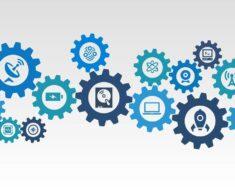
In a modern fast-paced company environment, keeping a record of financial transactions is more crucial than ever. Reliable and accurate bookkeeping is important for business success, to remain on top of the financial data in real-time to make informed and valuable decisions.
But traditional bookkeeping is tedious, prone to error and time taking. This is a phase where automation comes in. By utilising digital-age tools to streamline accounting tasks, businesses can save enough time and reduce errors. Moreover, it is forecasted that the accounting automated market is expected to reach $4.25 Million by 2023.
Unlock the Benefits of Automated Bookkeeping
Streamlines Data Entry with Automated Software
Data entry is one of the most time-intensive and error-prone bookkeeping aspects. Automation helps by reducing manual data entry tasks by automatically capturing information from different sources and entering it manually into the web-based software.
For example, organisations use Optical Character Recognition(OCR) technology to scan and extract information from invoices and receipts. It reduces errors, speeds up the bookkeeping process and eliminates human data entry needs.
So, the first and primary step to evaluate the current manual data process is to identify areas where automation can increase productivity. It may include tasks like bank reconciliations, financial reporting and data entry.
Once the company identifies the areas the next step is to select software that can fulfil the company’s requirements.
The next step is to set up the software which involves configuring it to match the business requirements. Now it’s high time to automate the process. Remember, it’s also important to monitor the financial transactions by giving training to the employees.
Ensures Accuracy and Reduces Errors
Human mistake is a common bookkeeping problem. Usual mistakes such as misclassifying expenses or transposing numbers can result in serious consequences for organisations. Automated software ensures accuracy and reduces errors by providing real-time financial data updates and automating repetitive tasks.
By using this software, companies can reduce manual error risks, can make informed decisions that are based on real-time data and improve accuracy.
Increase Productivity and Efficiency
Automated bookkeeping can potentially increase productivity and efficiency. By eradicating repetitive manual tasks, organisations can spare valuable resources and time, allowing the whole department to focus on more strategic and operational tasks.
Automated software also helps in streamlining workflows, eliminating the time it takes to increase overall efficiency and execute bookkeeping tasks. It allows organisations to save time, work more efficiently and eventually enhance their bottom line.
Improves Financial Reporting
Accurate and reliable financial reporting is crucial to the success of any business. With automated bookkeeping services, organisations generate reliable financial reports, providing advanced information based on real-time financial insights.
Moreover, automated financial reports eliminate the risk of human errors and ensure the integrity or accuracy of financial data.
Enhanced Security
The security of financial statements is a top concern for organisations. Automation helps in providing a secure platform by restricting access to authorised personnel and by providing a secure platform for storing financial information. It reduces the risk of data leakage, ensuring the confidentiality of financial information.
Moreover, automated bookkeeping uses end-to-end encrypted technology to safeguard sensitive financial information. It ensures that data is successfully stored and transmitted, making it problematic and challenging for cybercriminals to gain access.
The benefits don’t end here, accounting automation, coupled with the expertise of business fraud solicitors, provides audit trails of all company financial statements that make it convenient to detect and investigate any kind of suspicious activity
Lowered Costs
The conventional way of bookkeeping is costly and requires considerable resources to maintain reliable financial records. Automated bookkeeping supports companies in reducing company costs by reducing errors, saving time and ultimately enhancing their bottom line.
It can also perform tasks more accurately and faster than traditional bookkeeping, reducing labour costs and saving time. Accounting automation helps in reducing the need for time-intensive tasks and eliminates errors. It helps in lowering costs that are linked with preventing financial losses and preventing mistakes.
This software also helps in streamlining financial processes, improving overall efficiency by automating manual tasks such as bank reconciliations, financial reporting and data entry. It also eliminates the need of hiring any bookkeeper or accountant for manual data entry tasks.
Conclusion
Automated bookkeeping is a powerful tool for organisations that can easily streamline and integrate bookkeeping tasks like reducing errors and can make informed decisions based upon real-time financial information. With the help of accounting automation, businesses can reduce cost, save time and improve security.






Hello! Someone in my Facebook group shared this website with us, so I came to give it a look. I’m enjoying the information. I’m bookmarking and will be tweeting this to my followers! Wonderful blog and amazing design and style.